非谓语动词(不定式的用法小结)
非谓语动词的用法总结
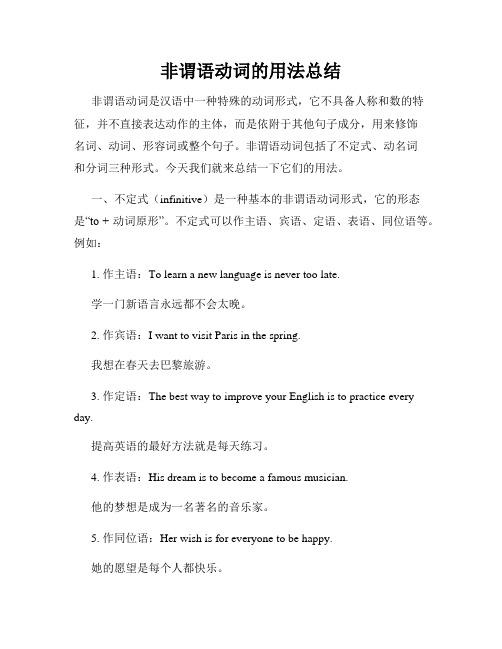
非谓语动词的用法总结非谓语动词是汉语中一种特殊的动词形式,它不具备人称和数的特征,并不直接表达动作的主体,而是依附于其他句子成分,用来修饰名词、动词、形容词或整个句子。
非谓语动词包括了不定式、动名词和分词三种形式。
今天我们就来总结一下它们的用法。
一、不定式(infinitive)是一种基本的非谓语动词形式,它的形态是“to + 动词原形”。
不定式可以作主语、宾语、定语、表语、同位语等。
例如:1. 作主语:To learn a new language is never too late.学一门新语言永远都不会太晚。
2. 作宾语:I want to visit Paris in the spring.我想在春天去巴黎旅游。
3. 作定语:The best way to improve your English is to practice every day.提高英语的最好方法就是每天练习。
4. 作表语:His dream is to become a famous musician.他的梦想是成为一名著名的音乐家。
5. 作同位语:Her wish is for everyone to be happy.她的愿望是每个人都快乐。
二、动名词(gerund)是名词化的动词,它的形态是动词的现在分词形式(V-ing),可以作主语、宾语、定语、表语等。
例如:1. 作主语:Swimming is good for your health.游泳对身体健康有好处。
2. 作宾语:He enjoys playing basketball in his free time.他喜欢在空闲时间打篮球。
3. 作定语:I have a meeting with my boss this afternoon.我今天下午有个与老板的会议。
4. 作表语:Her favorite activity is dancing.她最喜欢的活动是跳舞。
英语非谓语动词用法总结

千里之行,始于足下。
英语非谓语动词用法总结非谓语动词是英语中一种特殊的动词形式,它们没有主语,也没有时态的变化。
非谓语动词分为不定式、分词和动名词三种形式。
它们在句子中可以充当动词、形容词或名词的作用,用来修饰或补充主句的内容。
非谓语动词用法灵活多样,可以用在主句的前面、后面或中间位置,并且可以与其他成分同时存在于一个句子中。
在本文中,我将总结非谓语动词的用法,并给出一些例子来帮助理解。
一、不定式(infinitive)1. 不定式作主语e.g. To learn English is my goal. 学英语是我的目标。
2. 不定式作宾语a) 动词后直接接不定式作宾语e.g. I want to go to the cinema. 我想去电影院。
b) 动词后接代词(宾格)+不定式作宾语e.g. She advised me not to buy that car. 她建议我不要买那辆车。
3. 不定式作宾语补足语e.g. I found it hard to understand his accent. 我发现很难理解他的口音。
4. 不定式用来表示目的e.g. I went to the library to borrow some books. 我去图书馆借书。
5. 不定式用来表示结果第1页/共3页锲而不舍,金石可镂。
e.g. She was too tired to continue working. 她太累了,无法继续工作。
6. 不定式用来表示原因e.g. He called me to apologize. 他打电话给我道歉。
7. 不定式用来表示方式e.g. She danced gracefully to the music. 她优雅地随着音乐跳舞。
二、分词(participle)1. 现在分词(-ing形式)a) 分词作定语,修饰名词e.g. The running dog is mine. 那只奔跑的狗是我的。
高考非谓语动词不定式用法小结
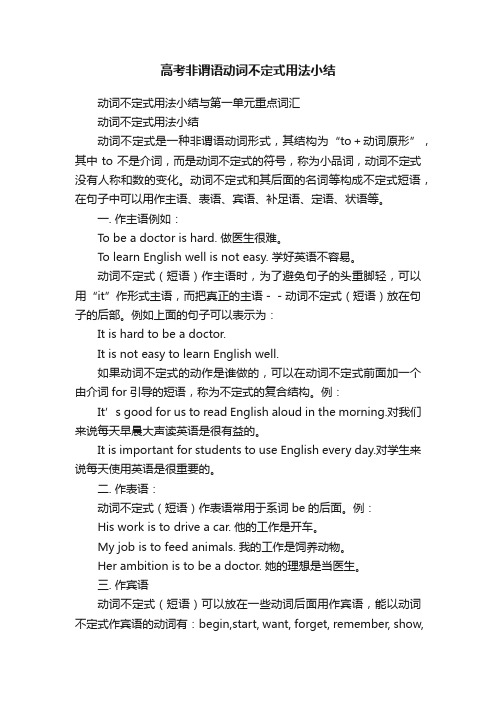
高考非谓语动词不定式用法小结动词不定式用法小结与第一单元重点词汇动词不定式用法小结动词不定式是一种非谓语动词形式,其结构为“to+动词原形”,其中to不是介词,而是动词不定式的符号,称为小品词,动词不定式没有人称和数的变化。
动词不定式和其后面的名词等构成不定式短语,在句子中可以用作主语、表语、宾语、补足语、定语、状语等。
一. 作主语例如:To be a doctor is hard. 做医生很难。
To learn English well is not easy. 学好英语不容易。
动词不定式(短语)作主语时,为了避免句子的头重脚轻,可以用“it”作形式主语,而把真正的主语--动词不定式(短语)放在句子的后部。
例如上面的句子可以表示为:It is hard to be a doctor.It is not easy to learn English well.如果动词不定式的动作是谁做的,可以在动词不定式前面加一个由介词for引导的短语,称为不定式的复合结构。
例:It’s good for us to read English aloud in the morning.对我们来说每天早晨大声读英语是很有益的。
It is important for students to use English every day.对学生来说每天使用英语是很重要的。
二. 作表语:动词不定式(短语)作表语常用于系词be的后面。
例:His work is to drive a car. 他的工作是开车。
My job is to feed animals. 我的工作是饲养动物。
Her ambition is to be a doctor. 她的理想是当医生。
三. 作宾语动词不定式(短语)可以放在一些动词后面用作宾语,能以动词不定式作宾语的动词有:begin,start, want, forget, remember, show,learn, like, hate, love, ask等。
非谓语动词(不定式)的用法
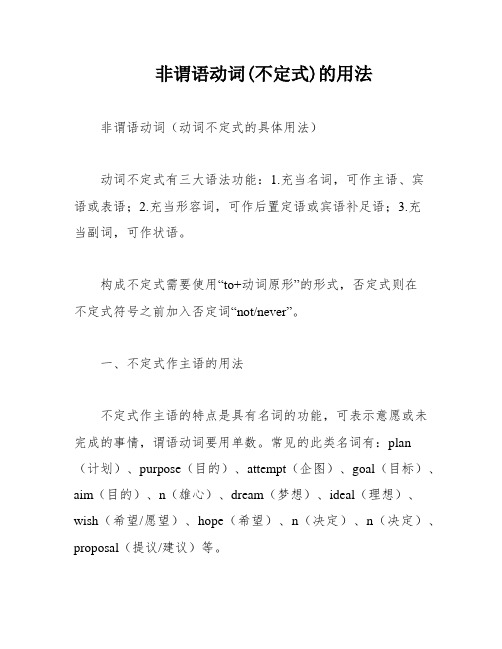
非谓语动词(不定式)的用法非谓语动词(动词不定式的具体用法)动词不定式有三大语法功能:1.充当名词,可作主语、宾语或表语;2.充当形容词,可作后置定语或宾语补足语;3.充当副词,可作状语。
构成不定式需要使用“to+动词原形”的形式,否定式则在不定式符号之前加入否定词“not/never”。
一、不定式作主语的用法不定式作主语的特点是具有名词的功能,可表示意愿或未完成的事情,谓语动词要用单数。
常见的此类名词有:plan(计划)、purpose(目的)、attempt(企图)、goal(目标)、aim(目的)、n(雄心)、dream(梦想)、ideal(理想)、wish(希望/愿望)、hope(希望)、n(决定)、n(决定)、proposal(提议/建议)等。
为了避免主语过长,不定式短语可放在句末,用形式主语“it”代替原来的主语位置,不定式则成为真正的主语。
例如:___.(赢得冠军是我的雄心。
)To master a foreign language is necessary.(掌握一门外语是有必要的。
)To e President of the United States used to be my goal.(过去我的梦想是成为美国总统。
)Speaking perfect English is always my dream.(说一口流利的英语一直是我的梦想。
)It is ___.(保护环境是有必要的。
)There are two special ___:1) It is + adj + of sb + to do sth.2) It is + adj + for sb + to do sth.___ characteristics and differences are:1) If ___ characteristics or traits。
the logical subject of the ___ "of."Examples:It is very affable of you to help me。
非谓语动词用法详解

非谓语动词用法详解动词的非谓语形式有三种:不定式、动名词和分词(一)不定式不定式由“to十动词原形”构成,其否定形式是“not to do”.不定式可以带宾语或状语构成不定式短语,没有人称和数的变化,但有时态和语态的变化.不定式可作主语、宾语、状语、表语和定语,但不能单独作谓语.不定式的逻辑主语有时用“for十名词或代词宾格”构成.1.不定式的用法:l)作主语.不定式短语作主语时,往往放在谓语之后,用it作形式主语.例如:To see is to believe.It is right to give up smoking.2)作宾语.不定式短语作宾语时,如果还带有宾语补足语。
往往把不定式宾语放在宾语补足语之后,而用it作形式宾语.例如:He wanted to go.I find it interesting to study work with him.3)作宾语补足语.例如:He asked me to do the work with him.注意:在feel,hear,listen to,look at,notice, observe,see,watch,have, let,make等词后的补足语中,不定式不带to.但是这些句子如果变成被动结构时,就必须带to.例如I often hear him sing the song.He is often heard to sing the song.注意:不定式动词在介词but,except,besides后面时,如果这些介词之前有行为动词do的各种形式,那么,这些介词后的不定式不带to,否则要带to.如:She could do nothing but cry.What do you like to do besides swim?I have no choice but to go.动词help之后,带to或不带to都可以。
Will you please help me (to) take this suitcase? 请你帮我提一下这个衣箱好吗?She often helps her mother (to) clean their house. 她经常帮助她妈妈打扫房子。
非谓语动词用法总结
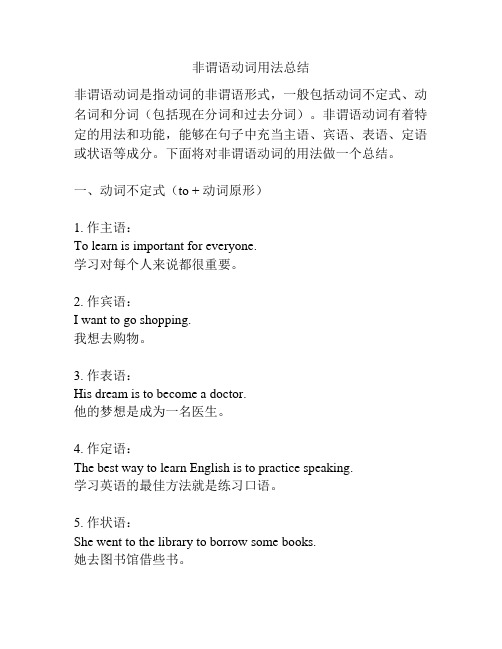
非谓语动词用法总结非谓语动词是指动词的非谓语形式,一般包括动词不定式、动名词和分词(包括现在分词和过去分词)。
非谓语动词有着特定的用法和功能,能够在句子中充当主语、宾语、表语、定语或状语等成分。
下面将对非谓语动词的用法做一个总结。
一、动词不定式(to + 动词原形)1. 作主语:To learn is important for everyone.学习对每个人来说都很重要。
2. 作宾语:I want to go shopping.我想去购物。
3. 作表语:His dream is to become a doctor.他的梦想是成为一名医生。
4. 作定语:The best way to learn English is to practice speaking.学习英语的最佳方法就是练习口语。
5. 作状语:She went to the library to borrow some books.她去图书馆借些书。
二、动名词(Ving形式)1. 作主语:Swimming is good for health.游泳对健康有好处。
2. 作宾语:I enjoy reading novels in my free time.我喜欢在空闲时间读小说。
3. 作表语:Her favorite hobby is drawing.她最喜欢的爱好是画画。
4. 作定语:I saw a man reading a newspaper in the park.我看到一个在公园里读报纸的人。
5. 作状语:She improved her English by practicing every day.她通过每天练习提高了她的英语。
三、分词(普通形式:Ving形式或者过去分词形式)1. 作定语:The smiling girl is my sister.那个笑着的女孩是我的妹妹。
2. 作补语:I saw him running in the race.我看到他在比赛中奔跑。
非谓语动词的用法总结例句
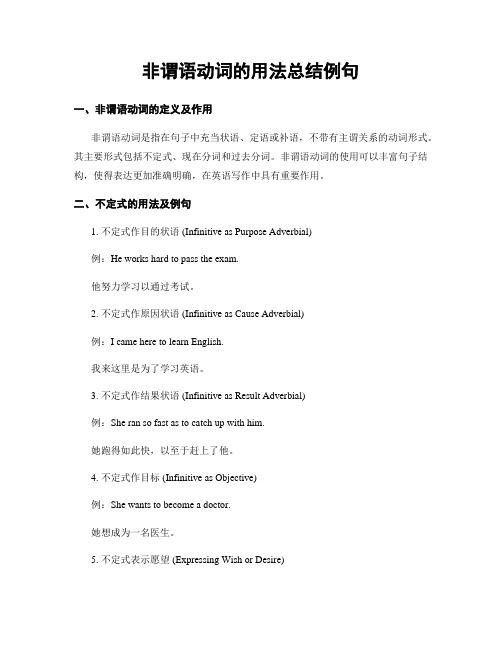
非谓语动词的用法总结例句一、非谓语动词的定义及作用非谓语动词是指在句子中充当状语、定语或补语,不带有主谓关系的动词形式。
其主要形式包括不定式、现在分词和过去分词。
非谓语动词的使用可以丰富句子结构,使得表达更加准确明确,在英语写作中具有重要作用。
二、不定式的用法及例句1. 不定式作目的状语 (Infinitive as Purpose Adverbial)例:He works hard to pass the exam.他努力学习以通过考试。
2. 不定式作原因状语 (Infinitive as Cause Adverbial)例:I came here to learn English.我来这里是为了学习英语。
3. 不定式作结果状语 (Infinitive as Result Adverbial)例:She ran so fast as to catch up with him.她跑得如此快,以至于赶上了他。
4. 不定式作目标 (Infinitive as Objective)例:She wants to become a doctor.她想成为一名医生。
5. 不定式表示愿望 (Expressing Wish or Desire)例:I hope to see you again soon.我希望很快能再见到你。
6. 不定式作宾补 (Infinitive as Object Complement)例:We elected her to be our leader.我们选她作为我们的领导。
三、现在分词的用法及例句1. 现在分词作状语 (Present Participle as Adverbial)例:Walking in the park, she met her old friend.她在公园里散步时遇到了她的老朋友。
2. 现在分词作定语 (Present Participle as Attributive)例:He gave me an interesting book written by himself.他给了我一本有趣的自己写的书。
(完整版)非谓语动词(不定式)的用法

非谓语动词(动词不定式的具体用法)Step1. 动词不定式的3大语法功能(1)不定式可充当主语,宾语,表语,具有名词的功能.(2)不定式可充当后置定语或宾语补足语,具有形容词的功能.(3)不定式可充当状语,具有副词的功能..Step2.不定式的构成,即:“不定式符号to+动词原形”.Step3. 不定式的否定式,否定词一定放在不定式符号之前,即:“not/never+不定式+动词原形.一,不定式作主语的用法.特点:“to+动词原形”所形成的形式具有名词功能.名词可在句中充当主语,宾语或者表语,同理,不定式也有相同的功能.1. 不定式作主语的特点:(1)可以表示一种意愿或未完成的事.(2)谓语动词用单数.E g: To win the championship is my ambition.主语系动词表语译文:赢得冠军是我的雄心.E g: To master a foreign language is necessary.主语系动词表语译文:掌握一门外语是有必要的.E g: To become President of the United States used to be my goal.主语谓语宾语译文:过去我的梦想是成为美国总统2. 不定式作主语时,be动词之后的表语若是名词,一定是表示意愿,目的,企图等名词,用来表示尚未完成的事情.常见的此类名词有:plan(计划), purpose(目的),attempt(企图),goal(目标), aim(目的), ambition(雄心),dream(梦想), ideal(理想), wish(希望/愿望),hope(希望), decision(决定),determination (决定),proposal(提议/建议).E g: To speak perfect English is always my dream主语系动词表语译文:说一口流利的英语一直是我的梦想.3. 由于不定式短语作主语,显得主语过长,为了避免头重脚轻,达到句子平衡,把不定式短语放在句末,在原来主语的位置上“it”代替,形式上占一个主语的位置,称之为形式主语,不定式称为真正的主语.E g: It is necessary to protect the environment.形式主语系动词表语不定式作真正主语译文:保护环境是有必要的.4. 不定式作主语的两种特殊结构(1)句型:It is +adj(形容词)+of sb +to do sth.(2) 句型:It is +adj(形容词)+for sb +to do sth.特点和区别:(1)若形容词表示人的本质特征,特性,就用“of”引出的不定式的逻辑主语.A:表示人的本质特征和特性的形容词有:“good; nice; clever; wise; foolish; silly; stupid; rude; (im)polite , careless; careful; affable.E g: It is very affable of you to help me.译文:你真好帮助我.E g: It is very careless of you to lose your wallet.译文:你真粗心大意把钱包丢了.(2) 若形容词表示的不是逻辑主语的特性,而是描述对逻辑主语所做的事情,就用介词“for”,B:常见的此类形容词有:“easy; hard; difficult; heavy; necessary; impossible; important.E g: It is impossible for me to get to the destination on time inan hour.译文:一个小时之内按时达到目的地对我来说是不可能的.E g: It is very difficult for me to work out the math problem.译文:解决这个数学问题对我来说太难了.(3) 形容词表示人的特性的句子可转化成一个不定式作状语的句子,而后者则不能.E g: It is very kind of you to help me with my English可转化为一个不定式作状语的句子= You are very kind tohelp me with my English.二,不定式作宾语的用法.(1)作及物动词的宾语,该及物动词均为表示意愿,企图的动词,表示具体的或者特定的动作,或者是将来的动作.常见的动词如下:want(要); wish(希望); hope(希望); desire (欲望/渴望); intend意图;try(设法); determine(决定); decide(决定); attempt(企图); endeavor(努力); plan(计划); like(喜欢); love(喜欢); expect(期望/盼望);pretend(假装); afford(承担得起); manage(设法); prepare(准备); long (盼望); arrange(安排); promise(答应/许诺); learn(学会);dare(敢);agree(同意);start/begin(开始); fail(失败); refuse(拒绝); 等.E g: I want to take a trip abroad next year.主语及物动词不定式作宾语时间状语译文:明年我要出国旅游.E g: I intend to visit you tomorrow主语及物动词不定式作宾语时间状语译文:我打算明天去拜访你.E g: He tried to kill two birds with one stone.译文:他设法一箭双雕.E g: I expect to get a raise.译文:我渴望获得加薪.E g: I can’t afford to buy a new car.主语及物动词动词不定式作宾语译文:我买不起新车.(2)若作宾语的不定式太长,如果其后还有形容词或名词担当宾语补足语,常用“it”作形式宾语,把不定式短语作真正的宾语后置.基本句式:“主语+及物动词+it(形式宾语)+名词/形容词(宾语补足语)+to+动词原形(真正宾语)”.常见的此类动词有“find(发现); think(认为); believe(相信); consider(认为); deem(认为); feel(觉得); make(使)E g: I think it useful to learn English well.主语及物动词形式宾语宾补不定式作真正的宾语译文:我认为学好英语是很有用的.E g: I deem it necessary to apologize to others.主语及物动词形式宾语宾补不定式作真正的宾语译文:我认为向别人道歉是有必要的.E g: I deem it an honor for me to give this speech.译文:能在这里进行演讲我认为这是我的荣幸.E g: We found it impossible to finish the project in a month.主语及物动词形式宾语宾补不定式作真正的宾语译文:我发现一个月之内完成这个项目是不可能的.E g: I make it a rule to get up early.说明:Make it a rule to+v 表示“把--------当作常例/习惯于-------------”.译文:我习惯早起.E g: The teacher made it a rule to speak only English in class.主语及物动词形式宾语宾补不定式作真正的宾语地点状语.译文:老师规定在课堂上这能讲英语.E g: I felt it stupid for him to talk like that.译文:我觉得他这样讲话挺愚蠢的.(3)疑问代词:“what ; which; whom +动词不定式(to+do)”共同作及物动词的宾语的用法特点:不定式后面的动词一定为及物动词,疑问单词“what ; which; whom”及物动词或者介词的宾语.E g: I can’t decide which one to buy.主语及物动词共同作宾语译文:我决定不了买哪一个.know what to do next.E g: I don’t译文:我不知道下一步该怎么办.E g: I can’t decide whom to turn to for help.译文:我决定不了向谁求救.E g: I hardly know what to say to you.译文:我简直不知道该对你说什么.(4)疑问代词:“what ; which; whom +动词不定式(to+do)”共同作及物动词直接宾语的用法E g: Would you please tell me which course to take?主语及物动词间接宾语直接宾语译文:你能告诉我应该选哪门课程吗?(5)疑问副词:“when; where; how;whether+动词不定式(to+do)”共同作及物动词宾语的用法特点:(1)不定式后面的动词可以为不及物动词.(2)不定式后面的动词也可为及物动词,且后面有宾语.E g: He patiently showed me how to operate the computer.主语状语及物动词间接宾语直接宾语译文:他耐心地教我怎么使用电脑.tell me when to start.E g: He didn’t译文:他并没有告诉我什么时候出发.know whether to go or stay.E g: I don’t译文:我不知道是走还是留.E g: I just wonder where to spend the weekend.译文:我只是想知道该去哪里度过周末.E g: Life is long if you know how to live it.译文:若知如何使用,生命就会长久.三,不定式作表语的用法.特点:(1)主语均为表示:“意愿”或者“企图”的名词.(2)不定式作表语可换作主语.E g: His only wish at present is to sleep.主语时间状语系动词动词不定式作表语译文:他此刻唯一的愿望就是去睡觉.可转化为:To sleep is his only wish at present.E g: His goal is simply to become an excellent English teacher.主语系动词状语动词不定式作表语译文:他的目标就是当一名优秀的英语教师.E g: His resolution is to become a great scientist.主语系动词动词不定式作表语译文:他的志愿时当一名伟大的科学家.E g: My dream is to become a successful businessman.译文:我的愿望是成为一名成功的商人.E g: The problem is to find a solution.译文:问题是得找出一个解决办法.E g: Shaking one’s fist is to show one’s determination.译文:挥拳头是显示一个人的决心.E g: The purpose of yelling English is to build up your confidence.译文:大喊英语的目的是建立你的自信心.不定式作表语的2种特殊情况(1)动词不定式作主语,也可作be动词之后的表语,主语和表语的动词形式一定要对称.E g: To see is to believe不定式作主语系动词不定式作表语译文:眼见为实E g: To love her this way is to worship her.不定式作主语方式状语系动词不定式作表语译文:这样爱他就等于崇拜她.(2)在下列句型中,be动词之后的to可省略,接动词原形作表语.E g: All you have to do is (to) take a good rest.主语系动词表语译文:你所要做的就是要好好的休息.E g: All I can do is (to) wait主语系动词表语译文:我所能做的就是等待.E g:What you should do is simply (to) apologize to him主语系动词状语表语译文:你应该做的事就是向他道歉.四,不定式作后置定语的用法.相当于形容词的功能.特点:(1)动词不定式作定语时一定要放在所修饰词的后面,作后置定语.(2)动词不定式与所修饰的名词之间有动宾关系.(3)不定式后面的动词为及物动词,若为不及物动词,一定要加上相应的介词.E g: I have a pile of homework to do tonight.主语及物动词宾语不定式作后置定语时间状语.译文:今晚我有一大堆的作业要做.不定式作后置定语的特殊用法(1)不定式作后置定语可以等于关系代词作主语所引导的定语从句.E g: I have no friend to advise me.主语谓语宾语不定式作后置定语等价于:I have no friend who can advise me.译文:我没有朋友可以给我忠告.(2)不定式作后置定语可以等于关系代词作宾语所引导的定语从句.E g: I have no one to talk to主语谓语宾语不定式作后置定语等价于:I have no one whom I can talk to.译文:我没有人可以交谈.E g: There are many sights to see here.等价于:There are many sights which we can see here.译文:这里有很多的风景可看.(3)主动的不定式和被动不定式的区别. A: 如果句子的主语是要做那件事的人,就用主动形式.B: 如果句子的主语是要做的动作(或者是接受动作的人或事),就用被动式.E g: I have two coats to wash.E g: Two coats are to be washed.(4) 在:“there be ”结构中的不定式可用主动式,也可用被动式,且意思一样.E g: There is an important thing to do tonight= There is an important thing to be done tonight.(5)不定式修饰序数词一定要放在其后.A:Li was the first to arrive.B: Really? That’s not like him. He’s always the last one to arrive.A: 李是第一个到的.B: 真的吗?那可不像他的作风,他总是最后一个到.五,不定式作状语的用法.特点:不定式作状语多放在被修饰的动词,副词,和形容词之后.注意其逻辑主语必须和句子的主语保持一致.在句中充当状语,表示目的;结果或原因.(1)不定式修饰动词的用法,一定置于该动词之后.E g: We should do whatever we can to save them.主语及物动词宾语从句不定式作目的状语的用法译文:我们应该做些什么才能挽救他们呢.(2) 不定式修饰动词作目的状语的用法.特点:不定式作目的状语,通常置于动词之后,也可置于句首,用逗号与主语隔开.E g: You should work very hard to win the award.主语谓语状语不定式作目的状语等价于:To win the award, you should work very hard译文:为了要赢得这个奖项,你应该努力奋斗.E g: I’ll do everything I can to help you.(目的)译文:我会竭尽全力帮你的.E g: You’re really very kind to say so.(原因)译文:你这么说真是太好了.还有类似不定式短语有:(1)in order to+动词原形..即可放在句首,也可句末.(2)so as to+动词原形.只能放在句末.(3)only to;(4) too-------to 太-------而不能(3)with an eye to +动名词. 只能放在句中. (4)with a view to +动名词. 只能放在句中.E g: He got up early in order to catch the school bus.主语谓语不定式作目的状语译文:他早起的目的就是能搭上校车.(3)不定式修饰形容词,一般置于该形容词之后.特点:一般表示一种结果.E g: He is able to do amazing things.主语系动词表语不定式作结果的用法译文:他能成就伟业.E g: He is apt to lie to me .主语系动词表语不定式作结果的用法.译文:他爱向我撒谎.E g: She was prepared to face the music.译文:她准备好面对后果.疯狂操练:I’m determined to conquer English. 我决心攻克英文I’m determined to master pronunciation. 我决心攻克发音.I’m determined to speak good English. 我决心说好英语.I’m determined to become a grammar king. 我决心成为语法大王I’m determined to command a lot of words. 我决心掌握大量词汇.I’m determined to write beautiful articles. 我决心写出漂亮文章.I’m determined to communicate with the world. 我决心与全世界沟通.(4)不定式修饰副词,一定置于该副词之后. 特点:一般表示一种结果.E g: He is old enough to go swimming alone.主语系动词表语状语(副词)不定式作结果的用法. 译文:他长大了,足以单独一个人去游泳.五,不定式作宾语补足语的用法.(1)具有使役动词意味的及物动词,加上宾语之后,要用不定式短语作宾语补足语.此类动词有:1) cause/get 促使-----------;2) lead引导--------说明:‘加上宾语之后,可接to引导的不定式短语,但此时to视为介词,接动名词作其宾语”;3) allow/permit允许------4)advise 劝告---------5)persuade说服----------6)enable使能够----------7)tell告诉-------8)beg/ask请求--------9)order命令---------10)want/wish/expect/intend期望---------11)force 迫使----------------.12)encourage鼓励-------.E g: The sad story caused him to cry.主语及物动词宾语不定式作宾语补足语译文:这个悲惨的故事使他哭了.E g: His timely help enabled me to finish the project in advance.主语及物动词宾语不定式作宾补时间状语译文:他及时的帮助使我能提前完成这个项目.allow me to smoke in the office.E g: They don’t主语及物动词宾语不定式作宾补地点状语译文:他们不允许我在办公室里吸烟.E g: I ask my students to yell English every morning.主语及物动词宾语不定式作宾补时间状语译文:我要求我的学生每天早上都大喊英语.E g: My parents want me to become a great lawyer in thefuture.译文:我的父母希望我将来成为一位很棒的律师.E g: The boss forces his staff to work like a dog for him.译文:老板强迫员工为他拼命干活.E g: My teacher encouraged me to try again.译文:我的老师鼓励我再试一次.(2)使役动词或者是感官动词,动词不定式作宾语补足语“to”要省略.巧记不定式作宾补省略“to”的两大规则A:“注意让‘买客’听听看看这块表有啥感觉不带“土”B: 五看(see; watch; notice; observe; look at); 三让(let; make; have);两听(hear; listen to); 一感觉(feel); 一发现(find); 半个帮(help).1)感官动词,宾语补足语接原型动词,表示已发生的事实..若出现在被动语态中,“to”要还原.E g: I noticed a thief slip into my room just now.主语及物动词宾语省略不定式原型动词作宾补时间状语译文:我刚才注意一个贼溜进我的房间了.E g: I never heard him speak English.译文:我从未听过他说英语.E g: The man was seen to leave the accident.(被动语态中不定式要还原)译文:有人看见他离开事故现场.2)使役动词(make/ let/ have)的具体用法.{1}“make”的常见用法. 若出现被动语态时“to”要还原.※make +宾语+宾补(形容词)E g: The news made me happy.主语及物动词宾语形容词从当宾语补足语.译文:这则消息使我很开心.※make+宾语+宾补(省略“to”的动词原形).疯狂操练 E g: My mother made me walk the dog. My father made me sweep the floor. My grandmother made me wash the dishes. My grandfather made me buy him cigarettes. Everyonein me family made me do something yesterday. I really enjoy helping other people.译文:我妈妈让我去遛狗.我爸爸让我擦地板.我奶奶让我洗碗.我爷爷让我给他买烟.昨天家里的所有人都让我干活了.我真的很乐意帮助他人.E g: These workers are made to work at least 18 hours each day.译文:这些工人被迫每天至少工作18小时.{2}“let”的用法. 很少出现被动语态中.※Let’s +动词原形. 让我们一起-------------------------E g: Let’s have dinner together tonight. 译文:让我们今晚一起吃晚饭.※Let us +动词原形. 让我们一起------------E g: Let us help Tom clean the room. 译文:让我们大家一起帮助汤姆打扫房间.※Let sb++动词原形. 让某人做某事.E g: Let me help you. 译文:让我来帮助你. {3}“have”的用法. 很少出现被动语态中.※have +宾语(人/)+宾补(过去分词充当)表示:请某人做某事※have +宾语(物/)+宾补(过去分词充当)表示:可以用来主语的遭遇或经历,并不是故意让某事发生的.特点:1) 作宾语补足语的动词与宾语之间是被动关系.2)该动作常不属于主语的动作.E g: I had my hair cut yesterday主语使役动词宾语过去分词作宾补时间状语译文:我昨天理的发.E g: Please have the boy taken to the station.译文:请找人把这男孩带到E g: The old man had his leg broken when he fell off the bike.译文:那老人从自行车上摔下来时把腿摔断了.※have+宾语(人/)+宾补(动词原形)表示“让某人做某事”E g: The director had his assistant pick up some hot dogs for the meeting.译文:主管让他的助理为这次会议准备一些热狗.※have+宾语(人/物)+宾补(动名词)表示:“让某人或某事不停地,或者一次又一次地进行某一动作.E g: He had us laughing all through. 译文:整顿饭期间他让我们笑个不停.六,不定式充当独立主格的用法.特点:不定式可以在句中充当独立成分,用来说明说话人的态度,对全句进行解释常见的有:“to be frank; to be honest; to tell the truth; to be blunt”等E g: To tell the truth, I have no money with me today.译文:我今天一分钱也没有带.E g: To be frank, you need to lose weight.译文:坦白说,你真的需要减肥.E g: To be blunt, that’s a stupid idea.译文:老实说,这想法真愚蠢.七,原型不定式的特殊结构.下列为与原型不定式连用的特殊结构.这些结构经常出现在各类英语考试中,务必要牢记.1): do nothing but +动词原形. 除了-----,无所事事.E g: He did nothing but eat all day.译文:他整天什么也不做,只是吃.分析步骤如下:第一步:句中的but 可视为并列连词,连接对等且形态相同的词类did,即He did nothing but did----------.第二步:我们知道do/does/did用于肯定句中,可视为强调性的助动词,之后要接动词原形.试比较:未强调前: He works hard. 他用功. 强调后:He does work hard. 他的确很用功.第三步:因此,在He did nothing but did----------中,did之后要接动词原形.即He did nothing but did eat all day.第四步:并列连词but之后相同的词类可以省略.本句中第一个did为不及物动词的一半过去时,而第二个did则为强调性的助动词,虽然性质不一,但外形相同,故第二个did可省略,即:“He did nothing but eat all day”.2): Choose/expect/want/desire nothing but to+动词原形.E g: He wanted nothing but to sleep. 译文:他什么都不要,只想睡觉.3): I have no choice but to+动词原形. 除了-------我别无选择.E g: I have no choice but to wait for the result.译文:除了等待结果我别无选择.4): be interested in nothing but+动名词/名词. 除了-----对什么也不感兴趣.E g: He is interested in nothing but singing.译文:他除了唱歌外,对什么都不感兴趣.5)enjoy nothing but+动名词/名词. 除了-----------对什么都不喜欢.E g: I enjoy nothing but dancing.译文:我除了跳舞外什么都不喜欢.6)cannot but+动词原形=cannot help/stop/ resist+动名词=cannot help but+动词原形.意思为:“不得不/忍不住-----------------”.E g: When I heard the story, I couldn’tb ut laugh/I couldn’thelp but laugh. 译文:我听到这个故help laughing/I couldn’t事,忍不住笑了出来.八,在下列含有to的动词短语中to 是介词的有,注意:“介词后面要接名词、宾格代词、动名词”如下:“1)be used to----------习惯于-------; 2)devote--------to献身于-------;3)get down to-------开始、着手-------;4)lookforward to-----期望、期盼;5)object to-----反对;6)be opposed to-----反对; 7)pay attention to-------注意、关注; 8)stick to---------;9)apply------to集中精力、专注坚持10)accustom-------to使------习惯于;11)help oneself to ------请随便------”等.E g: You should pay more attention to your health.译文:你应该多加注意身体.疯狂操练:You should pay more attention to your pronunciation. 你要多留意你的发音.You should pay more attention to your kids. 你要多留心你的孩子.You should pay more attention to your teeth. 你要多注意保护牙齿.You should pay more attention to your family.你要多关心家人. You should pay more attention to your schoolwork.你要多花心思在学业上.You should pay more attention to our environment.我们应该多关注保护环境.E g: She applied herself to learning English.译文:她刻苦学习英语.E g: You must accustom yourself to getting up early译文:你必须习惯早起.E g: I’ve been looking forward to hearing from you.译文:我一直期望收到你的来信.疯狂操练:Help yourself to something to drink. 你自己随便喝点什么,别客气.Help yourself to something to eat.你自己随便吃点什么,别客气.Make yourself at home. 别拘束.Sit down and relax for a while.坐下来放松一下.My home is your home.我的家就是你的家.。
高中英语非谓语动词用法小结
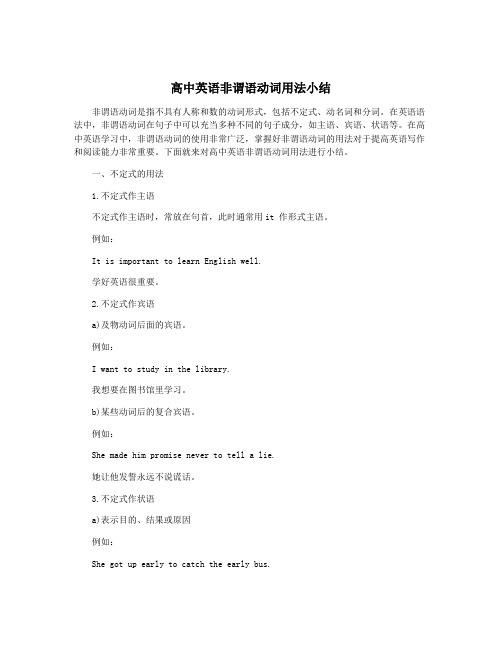
高中英语非谓语动词用法小结非谓语动词是指不具有人称和数的动词形式,包括不定式、动名词和分词。
在英语语法中,非谓语动词在句子中可以充当多种不同的句子成分,如主语、宾语、状语等。
在高中英语学习中,非谓语动词的使用非常广泛,掌握好非谓语动词的用法对于提高英语写作和阅读能力非常重要。
下面就来对高中英语非谓语动词用法进行小结。
一、不定式的用法1.不定式作主语不定式作主语时,常放在句首,此时通常用it 作形式主语。
例如:It is important to learn English well.学好英语很重要。
2.不定式作宾语a)及物动词后面的宾语。
例如:I want to study in the library.我想要在图书馆里学习。
b)某些动词后的复合宾语。
例如:She made him promise never to tell a lie.她让他发誓永远不说谎话。
3.不定式作状语a)表示目的、结果或原因例如:She got up early to catch the early bus.她早早起床是为了赶上早班车。
b)表示方式、条件等例如:People may use calculators to calculate.人们可以使用计算器来计算。
二、动名词的用法动名词可以作主语、宾语、表语或者定语,并且可以放在be 动词、实义动词和介词后面。
动名词也经常与情态动词、不定式和被动语态连用。
1.动名词作主语例如:Swimming is good for health.游泳对健康有益。
2.动名词作宾语动名词可以作及物动词的宾语,也可以作介词后面的宾语。
例如:I enjoy reading books.我喜欢读书。
4.动名词作定语例如:The girl sitting next to me is my best friend.坐在我旁边的那个女孩是我最好的朋友。
三、分词的用法分词包括现在分词和过去分词,它们可以作状语、定语、表语、主语、宾语等。
高中英语非谓语动词用法小结

高中英语非谓语动词用法小结一、不定式1. 不定式的形式:to + 动词原形2. 不定式作目的状语不定式常用于表示目的的短语中,可以置于句首、句中或句末。
例如:- He came to help us.- I work hard to pass the exam.- We need to study hard in order to succeed.7. 不定式的完成形式不定式的完成形式为to have + 过去分词,用来表示动作发生在不定式之前。
例如:- I am glad to have finished my work.8. 动词不定式的主动形式与被动形式动词不定式有主动形式与被动形式。
被动形式是由to be + 过去分词构成的。
主动形式用于表示主动或被动,被动形式用于表示被动。
例如:- I want to finish my homework.(主动)- I want my homework to be finished.(被动)二、动名词1. 动名词的构成动名词的基本形式是动词的-ing形式。
2. 动名词作主语动名词可以作主语。
当动名词作主语时,谓语动词通常用单数形式。
例如:- Smoking is bad for your health.- Swimming is a popular sport.三、现在分词和过去分词1. 现在分词的构成现在分词由动词原形+ing构成。
3. 过去分词的构成过去分词分为规则变化和不规则变化两种。
小结:高中英语非谓语动词主要包括不定式、动名词、现在分词和过去分词。
不定式可以作目的状语、结果状语、定语和后置定语等;动名词可以作主语、宾语、介词宾语和表语等;现在分词可以作定语和表语等;过去分词可以作定语和表语等。
熟练掌握非谓语动词的用法,能够使语言更加准确、丰富,提高表达的灵活性和准确性。
(完整版)非谓语的用法总结
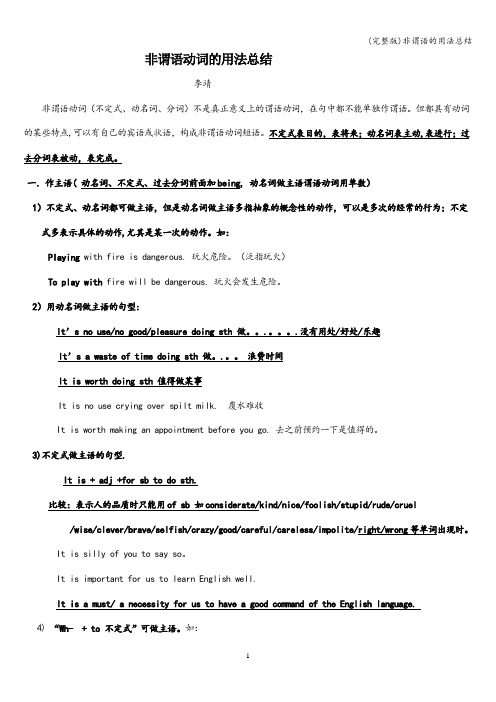
非谓语动词的用法总结李靖非谓语动词(不定式、动名词、分词)不是真正意义上的谓语动词,在句中都不能单独作谓语。
但都具有动词的某些特点,可以有自己的宾语或状语,构成非谓语动词短语。
不定式表目的,表将来;动名词表主动,表进行;过去分词表被动,表完成。
一.作主语( 动名词、不定式、过去分词前面加being, 动名词做主语谓语动词用单数)1)不定式、动名词都可做主语,但是动名词做主语多指抽象的概念性的动作,可以是多次的经常的行为;不定式多表示具体的动作,尤其是某一次的动作。
如:Playing with fire is dangerous. 玩火危险。
(泛指玩火)To play with fire will be dangerous. 玩火会发生危险。
2)用动名词做主语的句型:It’s no use/no good/pleasure doing sth 做。
.。
.没有用处/好处/乐趣It’s a waste of time doing sth 做。
.。
浪费时间It is worth doing sth 值得做某事It is no use crying over spilt milk. 覆水难收It is worth making an appointment before you go. 去之前预约一下是值得的。
3)不定式做主语的句型.It is + adj +for sb to do sth.比较:表示人的品质时只能用of sb 如considerate/kind/nice/foolish/stupid/rude/cruel /wise/clever/brave/selfish/crazy/good/careful/careless/impolite/right/wrong等单词出现时。
It is silly of you to say so。
It is important for us to learn English well.It is a must/ a necessity for us to have a good command of the English language.4) “Wh- + to 不定式”可做主语。
不定式非谓语动词用法解析

不定式非谓语动词用法解析不定式是一种特殊的非谓语动词形式,它可以不受主语和时态限制地在句子中充当名词、形容词或副词。
在英语中,不定式通常由“to”加动词原形构成,形式为“to + 动词原形”。
一、作名词用法1. 作主语不定式作主语时,常用于句子的开头,并且常常需要用形式主语“it”来代替。
例如:To learn a foreign language is not easy.(学习外语并不容易。
)2. 作宾语不定式作及物动词的宾语时,常位于动词之后。
例如:I want to go shopping.(我想去购物。
)3. 作介词的宾语不定式可以作为某些介词的宾语,常用的介词有:for, about, after, before, without, etc.例如:Thank you for helping me.(谢谢你帮助我。
)二、作形容词用法1. 作后置定语不定式可以用来修饰名词或代词,放在被修饰的名词或代词之后。
例如:I have a book to read.(我有一本书要读。
)2. 作表语不定式可以作为系动词的表语。
例如:Her dream is to become a doctor.(她的梦想是成为一名医生。
)三、作副词用法1. 修饰动词不定式可以修饰动词,表示目的、结果或原因。
例如:He went to the supermarket to buy some groceries.(他去超市买了些杂货。
)2. 修饰形容词或副词不定式可以修饰形容词或副词,常用于句子中den 给出愿望、建议或批评的时候。
例如:She is too young to go to school.(她太小不能上学。
)四、特殊用法1. “动词 + 宾语 + 不定式”某些动词后面接宾语时,可以通过不定式的形式来表示宾语的动作或状态。
常见的动词有:ask, tell, want, wish, advise, encourage, allow, etc.例如:She asked me to help her.(她请我帮她。
非谓语动词todo的用法小结
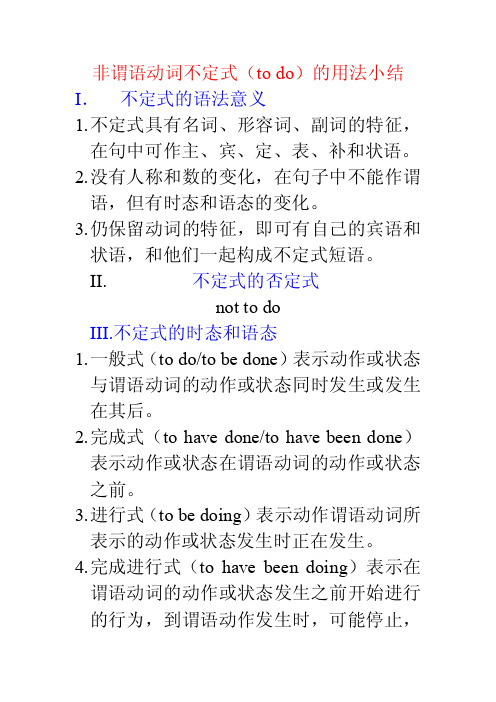
非谓语动词不定式(to do)的用法小结I.不定式的语法意义1.不定式具有名词、形容词、副词的特征,在句中可作主、宾、定、表、补和状语。
2.没有人称和数的变化,在句子中不能作谓语,但有时态和语态的变化。
3.仍保留动词的特征,即可有自己的宾语和状语,和他们一起构成不定式短语。
II. 不定式的否定式not to doIII.不定式的时态和语态1.一般式(to do/to be done)表示动作或状态与谓语动词的动作或状态同时发生或发生在其后。
2.完成式(to have done/to have been done)表示动作或状态在谓语动词的动作或状态之前。
3.进行式(to be doing)表示动作谓语动词所表示的动作或状态发生时正在发生。
4.完成进行式(to have been doing)表示在谓语动词的动作或状态发生之前开始进行的行为,到谓语动作发生时,可能停止,也可能会持续下去。
IV.不定式的功能1.作主语:(1)to do可直接作主语,表示特指一个具体动作。
eg.To swim in that river is very dangerous.To study English well isn’teasy.(2) 用it作为形式主语,而把真正的不定式主语放到句中。
常见的有6种。
It is +adj+ to do sth.eg.It is nice not to be dependent onothers.It is +adj+for sb to do sth.eg.It is not hard for one to do a bit of goodIt is +adj+of sb to do sth.eg. It is silly of you to believe him.= You are silly to believe him.It is +noun+to do sth.eg.It was not his habit to ask people for things.It+动词(+宾语)+ to do sth.eg.It took me a year to finish writing thebook.It is+介词短语+to do sth.eg.It is beyond my power to answer this question.2.作表语:to do作表语很普遍,多数情况下可换作主语eg.Her job is to teach us maths.To teach us maths is her job.3.作宾语:to do作宾语直接跟在vt 动词后面。
非谓语不定式的用法总结

非谓语不定式的用法总结
1. 嘿呀,非谓语不定式可以用来表示目的呢!就像“我去超市买东西
to get some food”,这里的“to get some food”就是为了说明去超市
的目的呀!
2. 哇塞,它还能用来作后置定语呢!比如“我有很多作业要做 a lot of homework to do”,这“to do”不就很巧妙地修饰了“homework”嘛!
3. 嘿,非谓语不定式有时还能表达结果呢!像“他跑得太快,以至于摔倒了He ran so fast as to fall down”,这结果是不是很直接呀!
4. 哎呀呀,还能表示出乎意料的结果呢!好比“她太粗心了,以至于犯了个大错She was so careless as to make a big mistake”,让人意想不到吧!
5. 嘿,它也能在某些形容词后作状语哦!像“我很高兴能见到你 I'm very glad to see you”,“to see you”不就很好地说明了高兴的原因嘛!
6. 哇哦,非谓语不定式还有一个很棒的用法呢,就是和疑问词连用呀!比如“我不知道该做什么 I don't know wh at to do”,多实用呀!
7. 嗨呀,它在句子中能起到好多作用呢,就如同一个小魔法!大家一定要好好掌握呀!
我的观点结论就是:非谓语不定式的用法真的很多很重要,大家一定要熟练运用呀!。
非谓语动词不定式

非谓语动词不定式非谓语动词不定式是英语中的一种语法结构,它具有多种用法和形式,是英语学习中比较基础和重要的一部分。
本文将分步骤阐述非谓语动词不定式的常见用法和相关注意事项。
一、基本形式非谓语动词不定式是由“to”加动词原形构成的,例如:to go, to eat, to sleep等等。
不定式也可以省略to,形成动词原形作为不定式,例如:go, eat, sleep等等。
这种形式被称为“裸不定式”。
二、用法1. 作主语或宾语不定式可以作句子的主语或宾语,例如:To travel is my dream.(旅行是我的梦想)I want to learn English.(我想学英语)2. 作目的状语不定式可以表示谓语动词的目的或原因,放在句子末尾,例如:She went to the supermarket to buy some groceries.(她去超市购买一些杂货)I am here to help you.(我在这里帮助你)3. 作定语不定式可以作为修饰名词的定语,放在被修饰的名词后面,例如:The book to read is on the desk.(要读的书在桌子上)The woman to marry is very beautiful.(要结婚的女人很漂亮)4. 作状语不定式可以表示时间、条件、结果等状语,放在句子中合适的位置,例如:He hurried in order to catch the last bus.(他赶快走为了赶上最后一班车)If you want to succeed, you must work hard.(如果你想成功,你必须努力工作)三、注意事项1. 句子主谓一致性当不定式作主语时,不能决定谓语动词的人称和数,“to”后的动词原形保持不变。
例如:To dance is her favorite hobby.(跳舞是她最喜欢的爱好)To study abroad is their dream.(出国留学是他们的梦想)2. 可以与情态动词连用不定式可以加上情态动词,例如:I can swim.(我能游泳)She should study harder.(她应该更加努力学习)3. 可以与被动语态连用不定式也可以与被动语态连用,形成被动不定式。
高中英语非谓语动词用法小结
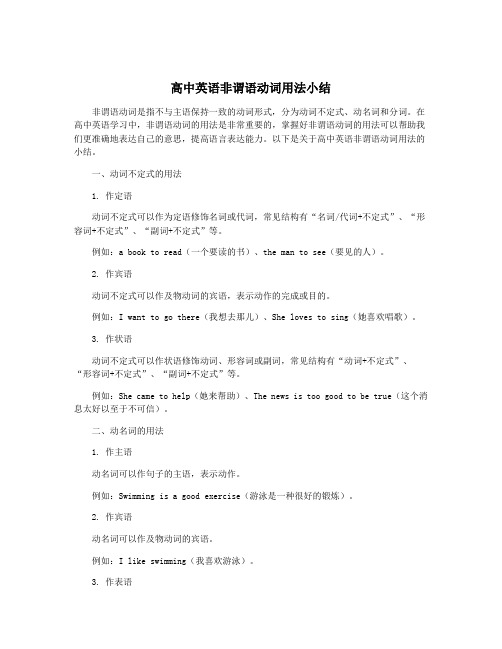
高中英语非谓语动词用法小结非谓语动词是指不与主语保持一致的动词形式,分为动词不定式、动名词和分词。
在高中英语学习中,非谓语动词的用法是非常重要的,掌握好非谓语动词的用法可以帮助我们更准确地表达自己的意思,提高语言表达能力。
以下是关于高中英语非谓语动词用法的小结。
一、动词不定式的用法1. 作定语动词不定式可以作为定语修饰名词或代词,常见结构有“名词/代词+不定式”、“形容词+不定式”、“副词+不定式”等。
例如:a book to read(一个要读的书)、the man to see(要见的人)。
2. 作宾语动词不定式可以作及物动词的宾语,表示动作的完成或目的。
例如:I want to go there(我想去那儿)、She loves to sing(她喜欢唱歌)。
3. 作状语动词不定式可以作状语修饰动词、形容词或副词,常见结构有“动词+不定式”、“形容词+不定式”、“副词+不定式”等。
例如:She came to help(她来帮助)、The news is too good to be true(这个消息太好以至于不可信)。
二、动名词的用法1. 作主语动名词可以作句子的主语,表示动作。
例如:Swimming is a good exercise(游泳是一种很好的锻炼)。
2. 作宾语动名词可以作及物动词的宾语。
例如:I like swimming(我喜欢游泳)。
3. 作表语动名词可以作系动词的表语,表示主语的状态或性质。
例如:His hobby is swimming(他的爱好是游泳)。
4. 作宾语补足语动名词可以作及物动词的宾语补足语,表示动作的结果或目的。
例如:He enjoys reading(他喜欢阅读)。
三、分词的用法1. 现在分词的用法现在分词常常表示伴随、时间、原因等。
例如:Walking along the street, I met an old friend(沿街走着,我碰到了一个老朋友)。
非谓语动词todo的用法小结

非谓语动词不定式(to do)的用法小结I.不定式的语法意义1.不定式具有名词、形容词、副词的特征,在句中可作主、宾、定、表、补和状语。
2.没有人称和数的变化,在句子中不能作谓语,但有时态和语态的变化。
3.仍保留动词的特征,即可有自己的宾语和状语,和他们一起构成不定式短语。
II. 不定式的否定式not to doIII.不定式的时态和语态1.一般式(to do/to be done)表示动作或状态与谓语动词的动作或状态同时发生或发生在其后。
2.完成式(to have done/to have been done)表示动作或状态在谓语动词的动作或状态之前。
3.进行式(to be doing)表示动作谓语动词所表示的动作或状态发生时正在发生。
4.完成进行式(to have been doing)表示在谓语动词的动作或状态发生之前开始进行的行为,到谓语动作发生时,可能停止,也可能会持续下去。
IV.不定式的功能1.作主语:(1)to do可直接作主语,表示特指一个具体动作。
eg.To swim in that river is very dangerous.To study English well isn’teasy.(2) 用it作为形式主语,而把真正的不定式主语放到句中。
常见的有6种。
It is +adj+ to do sth.eg.It is nice not to be dependent onothers.It is +adj+for sb to do sth.eg.It is not hard for one to do a bit of goodIt is +adj+of sb to do sth.eg. It is silly of you to believe him.= You are silly to believe him.It is +noun+to do sth.eg.It was not his habit to ask people for things.It+动词(+宾语)+ to do sth.eg.It took me a year to finish writing thebook.It is+介词短语+to do sth.eg.It is beyond my power to answer this question.2.作表语:to do作表语很普遍,多数情况下可换作主语eg.Her job is to teach us maths.To teach us maths is her job.3.作宾语:to do作宾语直接跟在vt 动词后面。
非谓语动词用法总结

非谓语动词用法总结非谓语动词是指在句子中不作谓语动词使用的动词形式,包括不定式、动名词和分词。
以下是它们的用法总结:1. 不定式(Infinitive):-结构:to + 动词原形-用法:-作主语:To learn a new language is challenging.-作宾语:She wants to eat lunch.-作宾语补足语:I find it difficult to understand.-作定语:The best way to learn is by doing.-作状语:She studies hard to succeed.2. 动名词(Gerund):-结构:动词的-ing形式-用法:-作主语:Swimming is my favorite sport.-作宾语:I enjoy reading books.-作宾语补足语:I consider him as my friend.-作定语:I saw a girl reading a book.-作状语:He left without saying goodbye.3. 分词(Participle):-有现在分词和过去分词两种形式。
-现在分词一般以-ing结尾,过去分词常以-ed、-en、-d、-t等结尾。
-用法:-作定语:The girl standing there is my sister. (现在分词)-作状语:Feeling tired, she decided to take a nap. (现在分词)-作宾语补足语:I saw the movie directed by Steven Spielberg. (过去分词)-与连系动词一起构成系表结构:The cake smells delicious. (现在分词)总的来说,非谓语动词在句子中可以充当多种不同的语法角色,包括主语、宾语、宾语补足语、定语和状语。
英语非谓语动词总结

英语非谓语动词总结非谓语动词(Non-finite Verbs)是指在句中不作谓语,不具有时态和人称变化,并且可以与其他动词、名词或代词连用,起到修饰、补充、限制、强调或表达目的等作用的动词形式。
常见的非谓语动词形式有不定式、动名词和现在分词。
以下是关于它们的详细总结。
一、不定式(Infinitive)1. 不定式的构成:to + 动词原形例:to go, to study, to eat2. 不定式的功能:(1)作目的状语例:I went to the store to buy some groceries.(2)作结果状语例:She worked hard to pass the exam.(3)作动词的宾语例:I want to learn English.(4)作形容词的定语例:He is the man to talk to.3. 不定式常见的固定搭配:(1)want/wish/hope/prefer to do sth.例:I want to learn to play the piano.(2)decide/plan to do sth.例:They decided to go on a trip.(3)agree/refuse/promise to do sth.例:He promised to help us with the project.二、动名词(Gerund)1. 动名词的构成:动词原形 + -ing例:going, studying, eating2. 动名词的功能:(1)作主语例:Swimming is my favorite sport.(2)作宾语例:I enjoy reading books.(3)作介词的宾语例:He is interested in playing basketball. (4)作表语例:Her favorite activity is dancing.3. 动名词常见的固定搭配:(1)enjoy/like/love/hate + 动名词例:She enjoys dancing in her free time. (2)keep/start/stop + 动名词例:The children kept playing games all night. (3)be/get + used to + 动名词例:She is used to getting up early.三、现在分词(Present Participle)1. 现在分词的构成:动词原形 + -ing例:going, studying, eating2. 现在分词的功能:(1)作定语例:The girl wearing a red dress is my sister.(2)作状语例:While studying, he realized the importance of education. (3)作补足语例:She kept me waiting for hours.(4)作独立成分例:Looking back, I realize how much I have grown.3. 现在分词常见的固定搭配:(1)catch/find/keep + sb./sth. + doing sth.例:I caught my brother eating my ice cream.(2)be/get + used to + 现在分词例:She is getting used to living alone.(3)can't help + 现在分词例:I can't help laughing when I see that video.以上是关于英语非谓语动词的总结,希望可以帮助到你。
英语非谓语动词的用法总结

英语非谓语动词的用法总结英语非谓语动词的用法总结一、非谓语动词的定义非谓语动词是指不充当句子的谓语,而作为谓语动词的补语,或者修饰某一动词词组,从而起到补充完善句子的作用的动词形式的统称。
非谓语动词由不定式、动名词、分词和过去分词组成,简称 NPV (non-finite verb)。
二、非谓语动词的用法1. 不定式的用法(1)不定式作宾语不定式可以单独作宾语,在句子中必须接受动作,通常在句子中作宾语。
e.g.I want to go to the theater.(2)不定式作状语不定式还可以用作句子的状语,表示时间、原因、条件、方式等。
e.g.He spoke in a low voice to avoid being heard.2. 动名词的用法(1)动名词作宾语动名词可以做宾语,表示被动概念,表示被动的动作,或表示持续性动作。
e.g. She enjoyed listening to the music.(2)动名词作宾补动名词也可以用作宾补,即动名词后面跟介词或介词短语,是动词的宾补。
e.g. He gave up smoking last year.3. 分词的用法(1)分词作定语分词可以单独作定语,强调它所修饰的名词,表示被动的动作,或持续性的动作。
e.g. The injured man was taken to hospital at once.(2)分词作状语分词还可以作状语,用来表达一定的时间,原因,条件,方式等意义。
e.g. He wafts into the room, smiling.4. 过去分词的用法(1)过去分词作定语过去分词可以作定语,修饰某一名词,表示动作已经发生或被完成。
e.g. The broken window was mended yesterday.(2)过去分词作宾补过去分词也可以作宾补,表示动词的宾补,只能接受介词或介词短语作补语。
e.g. He stood there lost in thought.三、补充非谓语动词是英语中很重要的一部分,它的用法很多,可以使句子变得更加生动,更加有表达力。
- 1、下载文档前请自行甄别文档内容的完整性,平台不提供额外的编辑、内容补充、找答案等附加服务。
- 2、"仅部分预览"的文档,不可在线预览部分如存在完整性等问题,可反馈申请退款(可完整预览的文档不适用该条件!)。
- 3、如文档侵犯您的权益,请联系客服反馈,我们会尽快为您处理(人工客服工作时间:9:00-18:30)。
非谓语动词(不定式的用法小结)非谓语动词(不定式的用法小结)动词不定式用法小结动词不定式是一种非谓语动词形式,其结构为“ to do ”,其中to不是介词,而是动词不定式的符号,称为小品词,动词不定式没有人称和数的变化。
但有时态和语态的变化。
动词不定式和其后面的名词等构成不定式短语,在句子中可以用作主语、表语、宾语、补足语、定语、状语,独立成分或与疑问词等连用。
一、结构: to do 否定式:not to do二、时态和语态不定式主动语态被动语态一般式to do to be done进行式 to be doing------------完成式to have done to have been done完成进行式to have been doing-----------(1).They pretended not to see us. (一般式表示与谓语的动作同时/几乎/发生在它之后.)(2). He pretended to be sleeping. (在谓语动词发生的同时,不定式的动作也正在进行)(3).She pretended to have known it before.(完成式表示动作发生在谓语动作之前)(4).We’re happy to have been working with you.(完成进行式表示谓语动作发生之前,不定式的动作一直在进行而且可能之后也继续)一. 作主语例如: To be a doctor is hard. 做医生很难。
To learn English well is not easy. 学好英语不容易。
☆单个不定式作主语时,谓语动词用单数☆动词不定式(短语)作主语时,为了避免句子的头重脚轻,可以用“it”作形式主语,而把真正的主语--动词不定式(短语)放在句子的后部。
例如上面的句子可以表示为:1) To learn English well is not easy.= It is not easy to learn English well.2) To use English every day is important for students. = It is important for students to use English every day.二. 作表语:( 系动词+ to do sth. ) 动词不定式(短语)作表语常用于系词be的后面。
例:1) 他的工作是开车。
His work is to drive a car.2) 我的工作是饲养动物。
My job is to feed animals.3) 她的理想是当医生。
Her ambition is to be a doctor.三. 作宾语 ( vt. + to do ) 动词不定式(短语)可以放在一些动词后面用作宾语,能以动词不定式作宾语的动词有:begin, start, want, forget, remember, show, learn, like, hate, love, ask , decide, expect, want, hope, wish, offer, fail, plan, learn, pretend, refuse, manage, help, agree, promise, prefer, mean 等等例如:1)I want to tell you a story. 我想给你讲个故事。
2)They begin to work at eight every morning. 他们每天早晨8点开始工作。
3)Don’t forget to lock the door.别忘了锁门。
4)Would you like to go and have a picnic with us tomorrow? 明天和我们一起去野餐好吗?☆注意: *如果and连接两个动词不定式,第二个动词不定式一般省“to”例:(1)He wants to go and have a swim with us. 他想和我们一起去游泳。
(2)若作宾语的动词不定式(短语)很长,可用it作形式宾语。
☆ I find it interesting to learn English with you. 我觉得和你一起学英语很有趣。
☆ He found it hard to catch up with others. 他觉得赶上别人很困难。
四. 作宾语补足语。
可以用动词不定式作宾语补足语的动词有:(want, wish, ask, tell, order, beg, permit, help, advise, persuade, allow, prepare, cause, force, call on, wait for, invite 等等:1. ( vt. + 宾语 + (to) do sth. ) 例如:The teacher asked us to read English for half an hour in the morning. 老师让我们早晨读半小时英语。
Please let me help you. 让我来帮助你。
2. with+宾语+ to do (表示将来的动作)With a lot of work to do, he didn’t go to the cinema. 对比:With all the work done, he went to the cinema.☆不定式作宾语补足语可以归纳为以下三种句式:1.要带to 的不定式作宾语补足语:tell /ask / want / would like / wish / like / invite /encourage /teach sb. to do sth.例:The teacher told us to come earlier tomorrow.I want you to go now. 我想让你现在就走。
Her parents wish her to be a teacher. 她父母亲希望她当老师。
2.不带“to”的不定式作宾语补足语:Let / make / have / see / watch / hear / notice / feel sb. do sth.Let the boy go out now. 让那个男孩出去。
The boy made the baby cry. 男孩弄哭了这个小孩。
I saw the students play basketball on the playground yesterday. 昨天我看见学生们在操场打篮球。
3.可省可不省的: help sb. (to)do sth.I often help my mother(to)do housework. 我经常帮妈妈做家务。
☆注意:如果将主动语态变为被动语态时,作宾语补足语的动词不定式变为主语补足语,动词不定式则不省“to”,即原来省的再加上,例:The boy made the baby cry. = The baby was made to cry by the boy. 那个孩子被男孩弄哭了。
4. ☆特别注意☆:不定式用在介词but, except, besides后时,如果这些介词前有行为动词do,does, doing, did, done,那么介词后的不定式不带to, 如果没有则要带to. (有do无to,有 to无 do.)(1). She could do nothing but cry.(2). What do you like to do besides sleep.(3). I have no choice but to go.五. 动词不定式作定语动词不定式作定语常用来修饰名词或不定代词,放于所修饰的词后,为后置定语,与所修饰的词有如下关系:1. 动宾关系:I have a meeting to attend.2. 主谓关系(be the first/second/last… to do ):He is always the first one to come.第一个到太空的中国人是杨利伟。
The first Chinese to travel in space was Yan Liwei.3. 同位关系(说明所修饰名词的内容):We all have a chance to go to college.☆ 注意:不定式为不及物动词时,所修饰的名词如果是地点、工具等,要有相应的介词,如:He found a good house to live in. 他找到了一幢很好的房子住。
Please give me a pen to write with. 请给我一支写字的笔。
☆但如果不定式修饰的是 time, place, way等就可以省略介词:如:He has no place to live.4. something, anything, nothing, everything 等复合不定代词常用不定式作后置定语Do you have anything to send.六. 动词不定式作状语:1. 作目的状语,常用在go, come, hurry等不及物动词后,表目的。
(常用的短语:in order to do, so as to do 等等:例如:He came here to see you.In order to keep healthy, he often play sports.2. 作结果状语:(常用结构:too…to; so …as to do; …enough to do; only to do; never to do.)1) I visited him only to find him out.2) Mike ate so much as to have a stomachache that day.☆ 注意:too…to 是否定的,表示太…而不能…, 但是,当too前面有only, all, but 时,意思是非常… 相当于very,是肯定的。
例如: I am only too pleased to be able to help you 能帮助你我非常高兴。
3. 作原因状语:(sb. + be/ feel +adj/adv + to do. )例如: They are very sad to hear the bad news.4. 表示程度 The question is easy for him to answer.七. 不定式和疑问词连用,可以作句子的主语、宾语、表语等。
